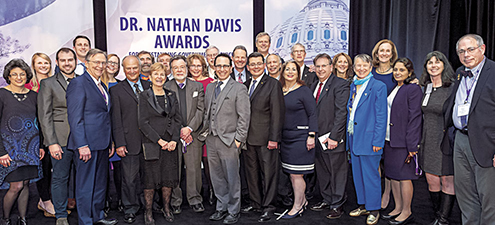By Brendan Abel, JD, MMS Legislative and Regulatory Affairs Counsel

Advocacy is a cornerstone of the mission of the Society. While many members support the MMS’s advocacy, far fewer have been directly involved with it. And perhaps even fewer appreciate the secret to MMS advocacy: it is only as strong as the members who get involved.
Fortunately, there are many ways to become involved. The first, of course, is by retaining membership. But it’s the involvement beyond dues paying that really counts. Much of the MMS state and national policy platforms are determined by the House of Delegates. (See p. 4 for a
story about medical student Nicholas Chiu’s advocacy for supervised injection facilities.) The process of proposing, debating, and refining HOD policy is an important first step in helping the MMS advocacy machine.
Joining a Committee
One important way to become directly involved in MMS advocacy is through joining MMS committees, like the Committee on Legislation (COL), which is tasked with prioritizing the Society’s various policies and establishing policy on emergent issues. Ted Calianos, MD, chair of the COL, notes, “I value the trust that the Society places in COL to establish positions on timely issues where there is no policy or precedent. This past summer, for example, the comprehensive health care cost bill could have had dire consequences for the practice of medicine and for our patients’ access to care. COL members offered their perspectives, debated the various options, and voted to take a
position on the bill. MMS leadership then ran with that position. It’s always gratifying to see the committee’s work turn into effective advocacy.” The MMS was the primary advocate focusing on physician-centric issues, such as substantial increases to licensure fees —
a proposal that ultimately did not pass last session.
Subject matter committees are regularly tapped for their insight into specific issues and bills and for help on certain questions brought by legislators. The Opioid Task Force’s expertise is regularly leveraged, as is the Committee on Public Health (on firearms legislation) and the Committee on Quality Medical Practice (on MassHealth ACO policy). The list goes on.
Physician Grassroots Advocacy
The MMS’s successes in advocacy rely on physicians’ on-the-ground experience with the issues legislators and regulators are working on. Written testimony offered by the Medical Society can often be helpful in providing data or offering proposed amendments, but minds are changed when a physician looks policymakers in the eye and tells them a story about how an issue affects his or her ability to care for patients. The MMS regularly meets with state and federal legislators and their staffs. For example, each spring, MMS members travel to the nation’s capitol to meet with
the Massachusetts congressional delegation as part of the AMA’s National Advocacy Conference. This is a great opportunity for the Medical Society to convey its priorities to policymakers directly.
There are many ways to get involved in MMS grassroots advocacy. Begin by paying attention to state and federal health policy. Check out the advocacy team’s updates in Vital Signs This Week. Attend legislative breakfasts, respond to MMS Calls to Action, and get to know your legislators. It’s much easier to advocate on an issue after you’ve
established rapport and gained trust. Finally, keep an eye out for a new grassroots system that the MMS will be launching this year. It will allow members to report their specific areas of interest and expertise. MMS leadership and staff will then be able to contact members about opportunities for direct advocacy and engagement that match their interests. Feel free to reach out to MMS leadership,
district or committee leadership, or MMS advocacy staff to learn more.

Governor Charlie Baker and his wife, Lauren, met with the MMS delegation that attended the AMA’s recent National Advocacy Conference. Governor Baker was presented with the Dr. Nathan Davis Award for Outstanding Government Service for his work on addressing the opioid addiction crisis. He was nominated by the MMS. Photo by Ted Grudzinski.
